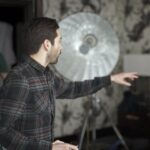 Q: What is the first lesson to learn in becoming a successful filmmaker?
Q: What is the first lesson to learn in becoming a successful filmmaker?
JW: Honestly, when you are starting out and are fulfilling an entry-level position, one of the most important things is “being on time!” In this industry, your reputation is all you have, so you better make sure you’re making a good impression on people the first time around — you may not get that second chance. You also want to pay attention. It seems so simple yet so few nascent filmmakers pay attention on set when they are not in a decision making role. If you pay attention, take notes and ask questions, you will learn the most and make a lasting impression. As your career progresses and you take on roles with more responsibility, you need to learn to trust the crew around you. Understand that your role is mainly to channel other people’s talents as opposed to imposing your vision on everyone.
Q: What do you wish you knew when you started your education in your field?
JW: I entered the industry with a high level of naiveté. For me, one hard learned lesson was that no one is ever going to give you anything. In order to make it, you have to actively (very actively) carve out your own opportunities AND when you think you have “made it” and can be a little more lax in your pursuit of the next project, you are in trouble, because you can never think, “I’ve made it.”
Q: How do I get the most out of my program at NYFA?
JW: By putting the most into the program, which is true of filmmaking or any life experience really. You must give everything you have with complete dedication. By working on as many projects with your classmates as time permits (maybe even with students from other departments). By spending extra time with your professors, asking questions and challenging them. By being open to constructive criticism and letting down your defenses. By networking with the students around you, these people will be your future collaborators once you leave school.
Q: What is the most valuable lesson you’ve learned in your professional career?
JW: Everyone who enters the film industry considers him or herself a creative person, and as a director or cinematographer you have to be open to their ideas, because people will become more invested in a project if they feel that even the tiniest part of the film would not have existed were it not for them. That is what you want, a crew that truly cares about the material and are not there just to garner a paycheck.
Q: Which pieces of equipment do you find most effective in your field?
JW: This may sound a tad lame but what everyone on set needs is a comfortable pair of shoes. It’s a long day, you are going to be on your feet for the majority of it. Beyond my go-to boots, I love my director’s viewfinder app on my iPhone. It allows me to quickly audition different focal lengths and communicate with my DP. Actually, there are some really great apps that I have found useful when on set.
Q: What are the essential first steps to breaking into this field after completing a program at NYFA?
JW: I would say to get as much experience and exposure as possible. Do not be afraid to take any job and never go onto a set thinking any role is beneath you, just because you went to film school. Everyone in this industry started somewhere, and for most of us, that was working for little to no pay as a Production Assistant. When you do get that first PA job, be an active participant on set, pay attention, take notes and make sure you introduce yourself to the key people. Make sure they know you are there. Maybe the most important piece of advice is never stop working on your own projects, whether that is writing, shooting, directing or editing, you still have to keep working. Keep yourself relevant and constantly add to your body of work. When someone does take notice of you and asks what you are working on, you want to have a whole slate of interesting projects.
Q: Who do you consider to be the most influential artists in your field?
JW: There are so many influential artists in my life, but if I had to choose one, it would be Roger Deakins. His work has been, and continues to be, an inspiration to me. From his multiple collaborations with the Coen brothers to his advising work on Wall-E, he consistently produces memorable imagery and beautiful frames without ever having the cinematography get in the way of the narrative. He’s also a very kind and giving teacher to those with whom he works and the online community at large. A very close second would have to be Chris Doyle, specifically his work with Wong Kar Wai — simply amazing. From a directing standpoint, I would have to say Martin Scorsese. He has influenced a whole generation of filmmakers, not just in NYC, but also across the globe. I almost fainted the first time I walked on set and heard him giving direction.